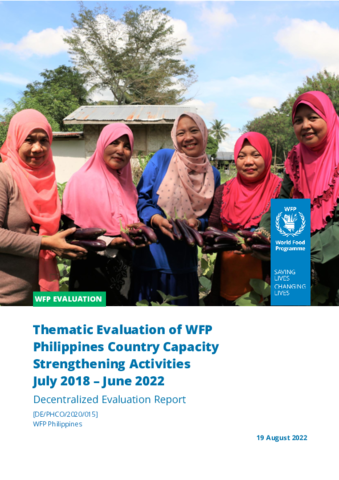
This decentralized evaluation was commissioned by the WFP Philippines Country Office and covers the Thematic Evaluation of WFP Philippines Country Capacity Strengthening Activities July 2018 – June 2022. It was carried out from September 2021 to late July 2021.
The evaluation was commissioned to enable the country office to systematically assess its completed and ongoing Country Capacity Strengthening (CCS) activities using evaluation criteria of relevance, sustainability, and effectiveness, and the WFP CCS framework and to review WFP Philippines’ strategic and operational approach to Country Capacity Strengthening activities WFP Philippines’ Country Strategic Plan (CSP) 2018- 2023. Overarching evaluation questions included:
- How relevant is WFP Philippines’ country capacity strengthening work to country priorities and people’s needs?
- How effective is the country office approach to country capacity strengthening?
- How sustainable are country capacity strengthening results?
- What factors have affected the country capacity strengthening results?
Key evaluation findings included:
- WFP’s CCS work is highly aligned to national goals and objectives. WFP plays a key role in shaping government policies and systems by providing technical expertise and supporting partnerships and initiatives. WFP’s work with Government and partners has enabled the Government of the Philippines to engage in collaborative work and make progress on its national and global commitments, including Sustainable Development Goals.
- CCS activities have progressed well across all five pathways of the CCS framework. The CCS pathways, Policies and Legislation and Institutional Effectiveness and Accountability, have seen the most effective results. The CCS approach focuses on maintaining relationships with government partners and stakeholders. This has ensured activities are relevant and address the capacity deficits/needs of the Government.
- The country office has strengthened coordination amongst partners operating in the Humanitarian-Development-Peace Nexus, especially in the Bangsamoro Autonomous Region of Muslim Mindanao (BARMM).
- Sustainability was not central to the design of many CCS activities though some CCS activities do have a likelihood of sustainability and continued growth. While WFP is committed to exploring avenues/mechanisms for sustainable funding, future funding remains unknown, which affects sustainability. Sustainable gains among beneficiaries are seen through training that builds the capacity of government implementing staff.
- The overall quality of assessment and analysis that informed the design and implementation of specific CCS activities is high, especially in the second half of the CSP. However, the country office is not set up to effectively support further growth given financing and associated human resources challenges. Gaps in performance data have restricted the analysis of activity progress based on outcomes and output indicators. The COVID-19 pandemic brought about challenges that impacted the planning and implementation of CCS work.
Key recommendations from the evaluation included:
- Focus strategic prioritization and resourcing on CCS domains and geographic areas where WFP and the country office have a demonstrated and differentiated value-add. This should be followed by a participatory needs assessment in these strategic areas.
- Develop a Theory of Change (ToC) specific to CCS (including focus areas) with an associated results framework to track performance across CSPs.
- Proactively engage with the Headquarters CCS Unit and Regional Bureau CCS advisor to formulate a CCS approach contextualized to country office activities. This should focus on principles and ways of working for a whole-of-government approach that leverages whole-of-CSP capacity.
- Continue investing in country office human resources improvements, specifically in a national capacity.
- Host structured sessions to guide CCS strategic decisions, and the implementation and learning for a whole-of-government approach.
